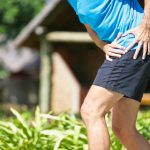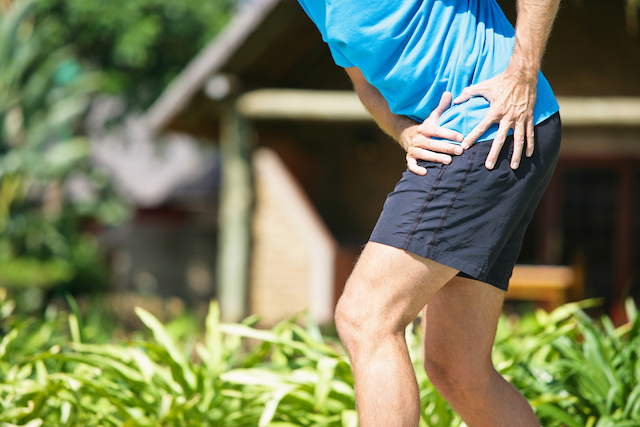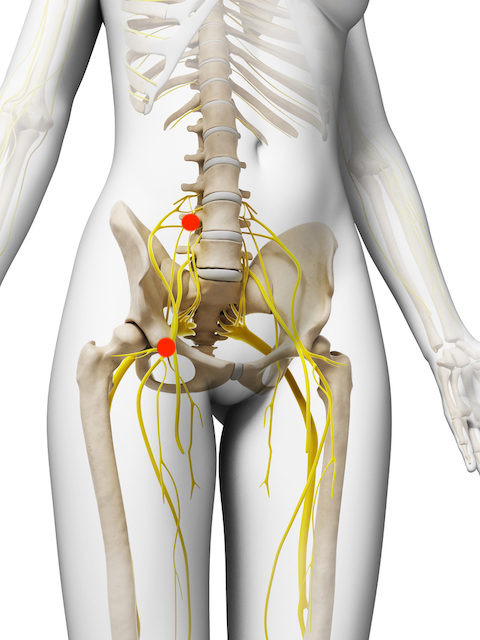Do you get sudden hip pain and your leg feels like it is giving out when you stand up or walk? Or maybe you notice your groin pain or hip pain when running or walking after awhile? Maybe you get low back pain or knee pain at the same time? Regardless, your hip pain is preventing you from enjoying your physical activities and for that matter just everyday walking and standing. The key to getting the proper treatment for hip pain is finding out the common causes of hip pain. Once you understand the root cause, you can get the correct treatment. So let’s carry on and find out what the common causes of hip pain are and what to do about it.
Common causes of hip pain I see in my practice
I have had many patients complain of “hip pain” or “groin pain”. Patients feel like their legs are buckling or giving out when they walk or when they stand up from a sitting position. When patients describe “hip pain” they can point to their low back, buttocks, side buttocks, front of the thigh or groin area. Here are the two most common causes of hip pain I see:
Pinched nerve in low back as the most common cause of hip pain
The most common cause of hip pain and groin pain I see is due to a “pinched” nerve from the lower back. The nerves from the lower back travels into your groin and down the front, side and back of your thighs and legs. If your spine is out of alignment your nerves can be “pinched” and pain can travel into your hip and groin. Furthermore, the muscles in your hip and thigh can become weak because the nerve signals to the muscles from your brain and spine get disrupted.
Seeing a chiropractor to get your spine adjusted into proper alignment helps takes the “pressure” off your nerves and helps to restore nerve flow to your brain and muscles. So your hip pain goes away and your muscles should get stronger. Getting chiropractic care for your hip pain will help you get back to your activities with full force.
The most common cause of hip pain and groin pain I see is due to a “pinched” nerve from the lower back.
Arthritis in the hip
The second most common cause of hip pain I see is arthritis in the hip. Like the lower back and knees, your hips absorb a lot of your weight when standing, walking, or running. So your hip joints are prone to more wear and tear and arthritis (osteoarthritis). You’re going to have less mobility when you have arthritis within your joints.
An x-ray of the hip can help determine if you have arthritis.
If you have been diagnosed with arthritis in your hip here are some tips to help you manage and treat it:
- Get assessed by a chiropractor to see if your posture is out of alignment. If your posture is out of alignment you won’t weight bear equally on your left and right sides. More weight and stress on one of your hips will speed up the wear and tear process in your hip joint.
- An anti-inflammatory diet can help decrease the inflammation (swelling) within your hip joint which will decrease your pain. As an added bonus, these diets often help people reach their ideal weight. Being overweight or obese is a risk factor for developing arthritis in your hip joints and low back.
- Taking a supplement called glucosamine sulphate can help decrease the swelling in your hip joint and rebuild your cartilage that is damaged.
- Start moving and exercising more if possible. Exercise helps reduce hip pain and improve mobility. (1) If weight bearing hurts too much, you may have to move into the pool, get on an exercise bike, or do floor exercises.
- If there is too much damage in your hip, sometimes the only option is a hip replacement. You would have to consult an orthopaedic surgeon for this.
The second most common cause of hip pain I see is arthritis in the hip.
Other common causes of hip pain
Tight Hip Muscles
Another common cause of hip pain, which may overlap with the other two common causes, is that muscles around the hip and pelvis area may be “tight”. Tight muscles around the hip joint often happen because of overuse or an injury.
There are many soft tissue techniques to help loosen up tight muscles. See a chiropractor, physiotherapist, or massage therapist that can deal with this.
Inguinal Hernia
This can be a common cause of hip pain. An inguinal hernia is where the intestinal tissues protrude through a weakness in the lower abdominal wall near the groin area.
Some of the symptoms you might get with an inguinal hernia would be pain on coughing, bending over, or exercising. As well, you might see a bulge in the groin area. Or you might get a heavy or full sensation in the groin area or pain itself.
You would have to seek out a medical doctor to attend to this.
Conclusion
Hip pain and weakness while standing, walking, or running are common complaints I see with my patients. By understanding the common causes of hip pain you can seek out the treatment that will be most effective at solving your hip pain. You can learn more by reading about how chiropractic treatment can help with hip pain.
If you or someone you know is grappling with hip pain, don’t hesitate to reach out to me. Together, we can pave the path to a pain-free and active life.
Stay well and stay informed!
For more information on how chiropractic care can help you and your family read Edmonton chiropractor Dr. Dean Collins’ complete guide to chiropractic care: Chiropractic Care for Everyone




Leave a Reply